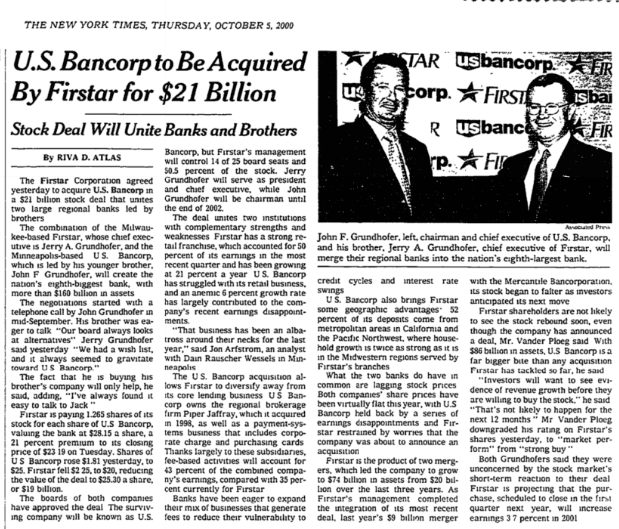
A short thread about bank strategy in the Covid era…
1/15
1/15
At the beginning of a crisis or economic downturn, the smart thing for a bank to do is to aggressively set aside money to cover future loan losses.
2/15
2/15
This is not an admission of error.
Loan losses at all banks increase in a crisis.
That’s a good thing -- at least to a reasonable degree.
We want banks to take risk.
That’s how an economy grows.
3/15
Loan losses at all banks increase in a crisis.
That’s a good thing -- at least to a reasonable degree.
We want banks to take risk.
That’s how an economy grows.
3/15
Similarly, aggressively setting aside money at the beginning of a crisis to absorb future loan losses, isn’t a sign of weakness.
Just the opposite.
It’s a sign of confidence, competence and institutional maturity.
4/15
Just the opposite.
It’s a sign of confidence, competence and institutional maturity.
4/15
The sooner a bank takes losses in a crisis, the better.
If things improve, the impact on a bank’s income statement is over.
If things deteriorate, it gives a bank more earnings to work with before tapping into capital.
5/15
If things improve, the impact on a bank’s income statement is over.
If things deteriorate, it gives a bank more earnings to work with before tapping into capital.
5/15
That’s why a bank’s strategy around provisioning at the beginning of a crisis says a lot about its risk management culture.
6/15
6/15
You can see this in the provisions that banks have taken so far this year.
The median year-over-year increase in provisions among large banks through the first three quarters of 2020 is 350%.
7/15
The median year-over-year increase in provisions among large banks through the first three quarters of 2020 is 350%.
7/15
The largest was @WellsFargo, at 677%.
Say what you will about Wells, and many of us have said many things, but it’s always been good at managing credit risk.
8/15
Say what you will about Wells, and many of us have said many things, but it’s always been good at managing credit risk.
8/15
Next largest is @PNCBank, at 487% -- another good bank when it comes to managing credit risk, though it was also bolstered in the second quarter by a huge gain from the sale of its stake in BlackRock.
9/15
9/15
Next are @jpmorgan, @MandT_Bank and @TruistNews -- all of which have long track records of exceptional performance.
10/15
10/15
This is why it’s perplexing to read about banks that have already decided to start releasing reserves, like the ones covered by @LauraAlix here…
americanbanker.com/news/fifth-thi…
11/15
americanbanker.com/news/fifth-thi…
11/15
It’s a peculiar strategy.
Even if these banks are right in their evident belief that the worst of the crisis is behind us, there’s still no incentive to release reserves now.
12/15
Even if these banks are right in their evident belief that the worst of the crisis is behind us, there’s still no incentive to release reserves now.
12/15
It isn’t going to help a bank’s valuation, which, at this point, is baked in.
Sure, some banks trade at higher valuations than others.
But that’s because of what they’ve done over the past 15 years, not over the past two weeks.
13/15
Sure, some banks trade at higher valuations than others.
But that’s because of what they’ve done over the past 15 years, not over the past two weeks.
13/15
Releasing reserves now only sets a bank up for disappointment later.
If they’re right, and things improve, they have fewer reserves to release later.
If they’re wrong, and things deteriorate, the preemptive move will erode confidence in their institutional maturity.
14/15
If they’re right, and things improve, they have fewer reserves to release later.
If they’re wrong, and things deteriorate, the preemptive move will erode confidence in their institutional maturity.
14/15
The moral of the story is that, in times like these, there's no reason to be a hero.
15/15
15/15
• • •
Missing some Tweet in this thread? You can try to
force a refresh







